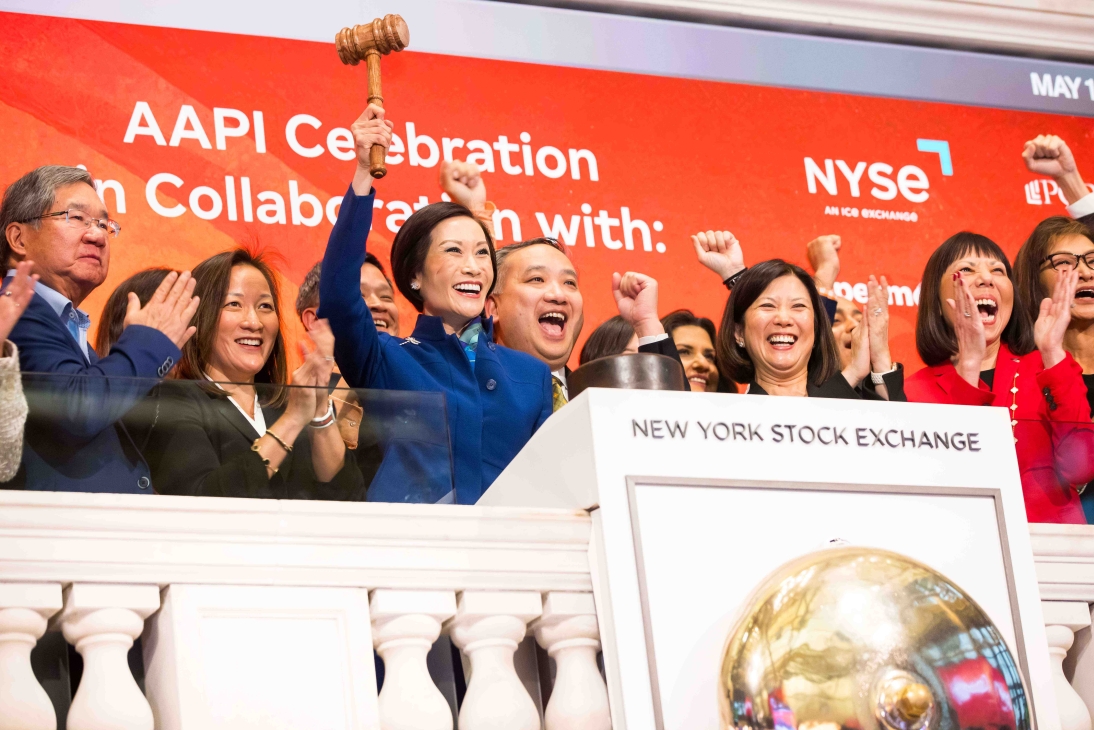Sometimes you have one of those moments where it feels like your career has come full circle.
Recently, I had the honour of ringing the closing bell at the New York Stock Exchange (NYSE) alongside a group of pan-Asian professionals marking Asian American Pacific Islander Month. To be invited to ring the bell is, of course, a career highlight for me and something I will never forget.
But it also made me pause to think back to the early days of my career, and to consider my roots.
When I was starting out, I didn't see a lot of Asian executives in senior leadership roles. They were mostly working alongside me in cubicles and middle management.
But in the C-suite, or in the corner offices I could see, there was little diversity. From where I sat, I could see the trend of Asians being underrepresented in executive leadership roles firsthand.
Then one day, still early in my career, I had a chance to hear a prominent corporate director, management consultant and best-selling author, deliver a keynote speech.
A highly regarded and influential business leader, he was charismatic and funny and at the top of his game with a high-profile career across leading corporations. He was also Asian.
In a very real sense, it was one of the first times I could truly see the potential for my own career. In his success, I could see possibilities, and for the first time, those possibilities felt within reach.
It was in that moment that I realized the power of visibility and representation.
At the time, I made a promise to myself that if I was ever in a position where I could help or inspire others to succeed, to see me as an example of what's possible, that I would do everything in my power to help.
My experience at the NYSE got me thinking about how occasions like Asian Heritage Month are not only to celebrate my culture and heritage, but also to learn about the cultures of friends and colleagues, and to appreciate the differences.
It's also a time to consider how we can help inspire the success of the next generation of Pan-Asian leaders.
"What's your background?"
“What’s your background?” It's one of those questions we’ve all been asked at one time or another.
I am of Chinese descent but was born in Saigon, Vietnam. My parents fled Vietnam under the cover of darkness when I was a child in the 1970s, escaping on a small boat. We drifted at sea for six days, packed in like sardines. Eventually the motor blew out. We ran out of food. I didn't know if we'd ever get off that boat.
Luckily, we were rescued and after spending time in a refugee camp, my uncle sponsored us as refugees, and we moved to Montreal. We arrived in Canada with the clothes on our back, in the dead of winter. One of my first memories of Canada is stepping into the snow in my sandals.
I attribute a great deal of my success to the values they passed on to us. They worked minimum wage jobs to make ends meet and establish themselves in this country, and they kept our culture alive at home.
Here's the thing: Canada is a nation of immigrants. For most of us, at some point, someone in our family made sacrifices to bring their family to a new country. To start a new life. To build a new home.
Moments like Asian Heritage Month – or Asian American Pacific Islander Heritage Month, as it's known in the United States – offer a reminder to reflect on the journeys of our families and ancestors and to be reminded of the impact we can make by inspiring and giving back to the next generation.
Remembering where I came from
The desire to help others led me to found Ascend Canada, a non-profit organization dedicated to enhancing the presence, visibility, and influence of current and future Pan-Asian business leaders.
Since it was launched in 2012, Ascend Canada now has chapters in cities across Canada that run on-going programs and events dedicated to helping more than 7,000 members achieve their professional goals and realize their full potential.
Moments like Asian Heritage Month are marked by events where we gather to celebrate our shared histories. People attend to show their support, learn and network. But at times, they can leave wanting more. How can they make a meaningful difference in their own career or the careers of others?
In these situations, I have found that asking a simple yet direct question like, "What can I do to help your career?" gives people an opportunity to truly communicate what they need. This leads to a more meaningful conversation. Often what people need is an introduction or a piece of advice that I can easily offer them.
When I rang the bell at the NYSE, I reflected on what it meant to me to see that keynote speaker all those years ago. I wondered if being up on that podium alongside other influential Asian leaders might serve as an inspiration for others, hoping to see their future in our success.
I believe that it is our duty to help the next generation of leaders succeed. Sharing our experience can make such a positive impact on up-and-comers. Sometimes just being there to listen or offer moral support makes all the difference.

